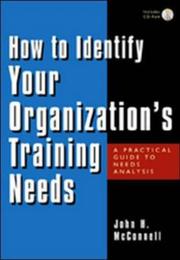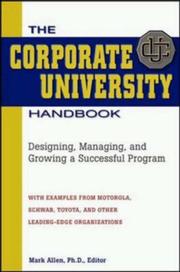| Listing 1 - 10 of 12 | << page >> |
Sort by
|
Book
ISBN: 0931050251 Year: 1985 Publisher: Princeton (N.J.) Carnegie Foundation for the Advancement of Teaching
Abstract | Keywords | Export | Availability | Bookmark
 Loading...
Loading...Choose an application
- Reference Manager
- EndNote
- RefWorks (Direct export to RefWorks)
Employees --- -Employer-supported education --- -Corporate education --- Education, Employer-supported --- Education within industry --- Employer-sponsored education --- Industry-sponsored education --- Education --- Laborers --- Personnel --- Workers --- Persons --- Industrial relations --- Personnel management --- Training of --- -Training of --- -Employees --- Employer-supported education

ISBN: 0814407102 9786611770327 1281770329 0814427014 9780814407103 Year: 2003 Publisher: New York: Amacom,
Abstract | Keywords | Export | Availability | Bookmark
 Loading...
Loading...Choose an application
- Reference Manager
- EndNote
- RefWorks (Direct export to RefWorks)
Employees --- Employer-supported education --- Training of --- Employer-supported education. --- Commerce --- Business & Economics --- Marketing & Sales --- Training of. --- Corporate education --- Education, Employer-supported --- Education within industry --- Employer-sponsored education --- Industry-sponsored education --- Employee development --- Employee training --- Employees, Training of --- In-service training --- Inservice training --- On-the-job training --- Training of employees --- Training within industry --- Vestibule schools --- Education --- Occupational training --- Employees - Training of
Book
ISBN: 9282636372 Year: 1992 Publisher: Berlin : European Centre for the Development of Vocational Training,
Abstract | Keywords | Export | Availability | Bookmark
 Loading...
Loading...Choose an application
- Reference Manager
- EndNote
- RefWorks (Direct export to RefWorks)
Continuing education --- Employees --- Employer-supported education --- Occupational training --- Formation professionnelle --- Training of --- Finance --- Finances --- Laborers --- Personnel --- Workers --- Persons --- Industrial relations --- Personnel management --- Job training --- Manpower development and training --- Manpower training programs --- Vocational training --- Education --- Training --- Education and training services industry --- Practice firms --- Corporate education --- Education, Employer-supported --- Education within industry --- Employer-sponsored education --- Industry-sponsored education --- Training of&delete& --- Finance.

ISBN: 0814403662 Year: 1998 Publisher: New York : AMACOM,
Abstract | Keywords | Export | Availability | Bookmark
 Loading...
Loading...Choose an application
- Reference Manager
- EndNote
- RefWorks (Direct export to RefWorks)
Employees --- Employer-supported education --- Personnel --- Education financée par l'employeur --- Training of --- Formation --- #PBIB:2000.3 --- Corporate education --- Education, Employer-supported --- Education within industry --- Employer-sponsored education --- Industry-sponsored education --- Employee development --- Employee training --- Employees, Training of --- In-service training --- Inservice training --- On-the-job training --- Training of employees --- Training within industry --- Vestibule schools --- Education --- Occupational training

ISBN: 058503608X 9780585036083 0814403662 Year: 1998 Publisher: New York : AMACOM,
Abstract | Keywords | Export | Availability | Bookmark
 Loading...
Loading...Choose an application
- Reference Manager
- EndNote
- RefWorks (Direct export to RefWorks)
Employees --- Employer-supported education. --- Employer-supported education --- Commerce --- Business & Economics --- Marketing & Sales --- Corporate education --- Education, Employer-supported --- Education within industry --- Employer-sponsored education --- Industry-sponsored education --- Education --- Employee development --- Employee training --- Employees, Training of --- In-service training --- Inservice training --- On-the-job training --- Training of employees --- Training within industry --- Vestibule schools --- Occupational training --- Training of. --- Training of
Book
ISBN: 9783030895822 Year: 2022 Publisher: Cham Springer International Publishing :Imprint: Springer
Abstract | Keywords | Export | Availability | Bookmark
 Loading...
Loading...Choose an application
- Reference Manager
- EndNote
- RefWorks (Direct export to RefWorks)
Employees --- Employer-supported education. --- Learning. --- Training of. --- Learning process --- Comprehension --- Education --- Corporate education --- Education, Employer-supported --- Education within industry --- Employer-sponsored education --- Industry-sponsored education --- Employee development --- Employee training --- Employees, Training of --- In-service training --- Inservice training --- On-the-job training --- Training of employees --- Training within industry --- Vestibule schools --- Occupational training --- Employer-supported education --- Training of

ISBN: 0814407110 0814420273 9780814426646 9786611770228 1281770221 0814426646 Year: 2002 Publisher: New York (N.Y.) AMACOM
Abstract | Keywords | Export | Availability | Bookmark
 Loading...
Loading...Choose an application
- Reference Manager
- EndNote
- RefWorks (Direct export to RefWorks)
Once the province of only the largest corporations, corporate universities are fast becoming the standard at smaller companies as well. This comprehensive handbook is a valuable resource for companies of all sizes who are considering (or already developing) enhanced professional learning programs. Featuring contributions from experts at ten different corporate universities, academic institutions, and consulting firms, the book addresses the three major components of corporate university success: organization, content, and processes. From structural and financial models to the role of technolog
Employees --- Employer-supported education. --- Organizational learning. --- Training of. --- Employees -- Training of. --- Commerce --- Business & Economics --- Marketing & Sales --- Corporate education --- Education, Employer-supported --- Education within industry --- Employer-sponsored education --- Industry-sponsored education --- Education --- Learning organizations --- Learning --- Communities of practice --- Knowledge management --- Employee development --- Employee training --- Employees, Training of --- In-service training --- Inservice training --- On-the-job training --- Training of employees --- Training within industry --- Vestibule schools --- Occupational training --- Employer-supported education --- Training of --- Organizational learning

ISBN: 0566085836 0815389396 9780834087527 1351156845 1351156829 9786611098155 1281098159 0754682951 1138619868 9780754682950 9781281098153 9780566085833 9781351156820 Year: 2005 Publisher: Aldershot, Hants, England ; Burlington, VT : Gower,
Abstract | Keywords | Export | Availability | Bookmark
 Loading...
Loading...Choose an application
- Reference Manager
- EndNote
- RefWorks (Direct export to RefWorks)
"From the moment the first corporate university (CU) was created and the term was coined, the central metaphor of university has proved a double-edged sword. The emphasis on university has been a driving force in moving companies beyond a restricted and siloed approach to training, to a central vision for learning within the organization. On the other hand, there have been failures and many corporate universities have struggled to bring a business rigour to learning or to align their development with the key business and financial drivers of the organization. Handbook of Corporate University Development draws on experience from around the world, to provide anyone responsible for strategy and learning - at senior levels in government, education and business - with a picture of current best practice. The Handbook is not a prescriptive 'how-to', rather an exploration of key issues such as:? Who owns a corporate university initiative?? How is the funding managed?? How is the CU aligned with business strategy?? How do CU directors and project managers deploy resources?? How do they deal with suppliers?? How do they report and measure CU performance?? What are the processes and technologies needed to provide and support different forms of learning?? How can you blend different media?? How do you assess what learning has taken place?? What are the future prospects and potential for corporate universities? It is time for the corporate university to demonstrate how business rigour, handled deftly and with strong and perceptive leadership, can revolutionize learning both inside and outside the organization. Handbook of Corporate University Development is an important catalyst towards this process."--Provided by publisher.
Employees --- Employer-supported education --- Organizational learning --- #PBIB:2005.4 --- Learning organizations --- Learning --- Communities of practice --- Knowledge management --- Corporate education --- Education, Employer-supported --- Education within industry --- Employer-sponsored education --- Industry-sponsored education --- Education --- Employee development --- Employee training --- Employees, Training of --- In-service training --- Inservice training --- On-the-job training --- Training of employees --- Training within industry --- Vestibule schools --- Occupational training --- Training of --- Employer-supported education. --- Organizational learning. --- Education financée par l'employeur --- Personnel --- Apprentissage organisationnel --- Training of. --- Formation
Book
ISBN: 1787434532 1787433455 1787433463 9781787433458 9781787433465 9781787434530 Year: 2017 Publisher: Bingley Emerald Publishing Limited
Abstract | Keywords | Export | Availability | Bookmark
 Loading...
Loading...Choose an application
- Reference Manager
- EndNote
- RefWorks (Direct export to RefWorks)
The corporate university is a whole-organisation endeavour for today, tomorrow and for the future, raising questions about the size and shape of your business and where you aim to reach. This book introduces you to the major areas of corporate university performance and value management, examining the evolution of the corporate university alongside emergent business challenges. It provides the pieces of a large jigsaw puzzle for you to assemble using the key disciplines and skills within your organisation. Change is an integral part of business life, and it can seriously affect your company's value. Gaining a good understanding of how all business processes add value to your company is vital. The aim of this book is to help you to access new ways to create a widespread culture of people and organisational development. You will discover effective management practices that will help you and your colleagues to become the leading agents of continuous change and development in all parts of your organisation. With the help of the corporate university model, your company can develop business solutions to resolve the challenges ahead in a changing world.
Employer-supported education. --- Employees --- Training of. --- Employee development --- Employee training --- Employees, Training of --- In-service training --- Inservice training --- On-the-job training --- Training of employees --- Training within industry --- Vestibule schools --- Occupational training --- Employer-supported education --- Corporate education --- Education, Employer-supported --- Education within industry --- Employer-sponsored education --- Industry-sponsored education --- Education --- Training of --- Business & Economics --- Management & management techniques. --- Organizational learning. --- Management. --- Learning organizations --- Learning --- Communities of practice --- Knowledge management
Book
ISBN: 9048139465 9048139473 Year: 2010 Publisher: New York : Springer,
Abstract | Keywords | Export | Availability | Bookmark
 Loading...
Loading...Choose an application
- Reference Manager
- EndNote
- RefWorks (Direct export to RefWorks)
Meeting the challenges of an unpredictable global future will be hard enough for all sectors, but one thing is certain: ongoing learning by all of the professions is vital. This book applies cutting-edge educational theory to the concept of lifelong learning. It argues for a significant paradigm shift from the traditional practice of providing programs to develop professionals, towards enabling professionals’ capability for authentic inquiry into their own practices. In doing so, the text contributes much to the ongoing debate about how professionals can be supported in ways that nourish them as individuals as well as leading to worthwhile and sustainable outcomes for society as a whole. The book highlights a disparity between the reality of professionals’ learning experiences and the rhetoric commonly employed in relation to professional performance development. Empirical data reveal that professionals take their responsibilities to improve their practice seriously, but consider their continuing learning needs to be more profound than that provided by narrow professional development rhetoric. The didactic and episodic nature of many professional development activities does not adequately support the multifaceted and idiosyncratic nature of authentic professional learning, as lived by professionals in practice. In this volume, the common themes across diverse experiences of learning are defined within a phenomenological framework as understanding, engagement, interconnection and openness. Realistic guidelines to support learning, in ways that balance professional accountability and agency, are elucidated in the context of this framework. The book highlights contemporary workplace dilemmas for professionals, including those working in healthcare, who are anxious to make a difference to the lives of those they care for. Drawing on phenomenological philosophy, Ann Webster-Wright explores the issue of authenticity in professional life as well as the contribution that professionals can make to society. ‘This book is a pioneering example of the kind of studies that are needed to further understanding of professional practice and how it can be improved. It focuses on what practitioners can do to act together for themselves. It applies the notion of being professional to the core of practice: learning from what one does.’ David Boud ‘This book does more than merely challenge the traditional way of conceptualising professional development. It also offers bases for reshaping efforts to secure all ongoing professional learning in ways centred on the learners themselves.’ Stephen Billet.
Human services personnel -- Education (Continuing education). --- Human services personnel -- Training of. --- Professional employees --- Education, Special Topics --- Labor & Workers' Economics --- Social Welfare & Social Work - General --- Business & Economics --- Education --- Social Welfare & Social Work --- Social Sciences --- Education (Continuing education) --- Employees --- Employer-supported education. --- Professional education. --- Professional employees. --- Training of. --- Professionals --- Education, Professional --- Corporate education --- Education, Employer-supported --- Education within industry --- Employer-sponsored education --- Industry-sponsored education --- Employee development --- Employee training --- Employees, Training of --- In-service training --- Inservice training --- On-the-job training --- Training of employees --- Training within industry --- Vestibule schools --- Education. --- Phenomenology. --- Lifelong learning. --- Adult education. --- Professional & Vocational Education. --- Lifelong Learning/Adult Education. --- Career education --- Education, Higher --- Technical education --- Occupational training --- Employer-supported education --- Training of --- Phenomenology . --- Adults, Education of --- Education of adults --- Continuing education --- Open learning --- Philosophy, Modern --- Vocational education. --- Lifelong education --- Lifelong learning --- Permanent education --- Recurrent education --- Adult education --- Education, Vocational --- Vocational training --- Work experience
| Listing 1 - 10 of 12 | << page >> |
Sort by
|

 Search
Search Feedback
Feedback About UniCat
About UniCat  Help
Help News
News